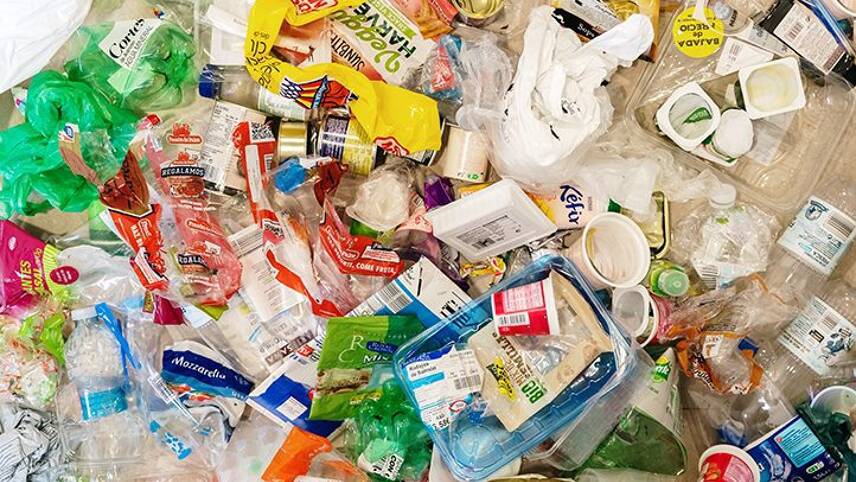Register for free and continue reading
Join our growing army of changemakers and get unlimited access to our premium content

Businesses are struggling with sustainability trade offs and costs
From today (April 1) manufacturers and importers of plastic packaging will have to comply with a new Plastic Packaging Tax (PPT). The PPT is a new tax on any plastic packaging – packaging that consists predominantly of plastics by weight – with less than 30% recycled plastic content.
The PPT has been introduced following lengthy Government consultations. It was first announced in the 2018 Budget and has since evolved as key stakeholders engage with policymakers on the topic.
Here, edie rounds up the key points of the PPT and what they could mean for businesses.
How is PPT applied?
The PPT takes effect from today (1 April) and is applicable to manufacturers and importers of plastic packaging. For any plastic packaging that consists of less than 30% recycled plastic content, businesses will have to pay a rate of £200 per metric tonne.
Businesses will need to audit their procurement and manufacturing processes to uncover whether they need to register for the PPT. They can do so via the Government portal from today.
If a business falls under the 30% threshold, it will need to register for the PPT within 30 days of exceeding a 10-tonne limited threshold.
What businesses will be impacted?
According to the Government, the PPT is expected to impact around 20,000 manufacturers and importers of plastic packaging in the UK.
However, there is a chance that downstream businesses could be liable to pay PPT under Government guidance. Under the current implementation of the PPT, downstream businesses that purchase packaging which should’ve been taxed may be found jointly liable if it is yet to be paid. So, it is best to put practices in place to not only move away from the threshold if possible, but to ensure that tax has been paid before purchasing.
How should businesses respond to PPT?
Late last year, the Government issued new guidance on due diligence for businesses.
The guidance does not provide a set of checks for businesses to carry out, but does state that businesses have the responsibility to outline “relevant, reasonable and proportionate” checks across the supply chain where applicable.
Questions also remains as to how the PPT will be governed, with green groups calling for more clarity on the initiative.
A Plastic Planet co-founder Sian Sutherland said: “A Plastic Planet called for it, and nearly four years after it was announced the world’s first plastic packaging tax has finally been delivered. But the result is underwhelming, with a raft of concerns sprouting from its design.
“First off, there needs to be clarity around who will be policing it, ensuring that packaging producers are held accountable for complying with it. We’ve witnessed this before, when loopholes are made available to industry, we will fail. Secondly, the tax doesn’t go far enough. 30% recycled content is a drop in the vast plastic waste ocean, and fails to incentivise a dramatic shift away from virgin plastic. This tax needs to go further. All plastic should be taxed because, unless incinerated, eventually all of it ends up in our environment. Plastic was never designed to be circular.
“A plastic tax can be a powerful tool for inspiring industry to move away from this toxic, highly polluting material, but only if it is delivered right. We therefore call on the Government to urgently strengthen its tax with robust measures which will force the hand of industry to turn off the plastic tap.”
What could the costs be for businesses?
The PPT currently sits at £200 per metric tonne, which could create a sizeable cost depending on the size of your business.
The Government states that there will be an average annual net increase for costs to business, but this would largely fall into administrative spending at would collectively reach £0.4m across the UK. The Government states that “one-off” costs such as staff training, HMRC registration and reporting on tax returns will apply.
However, experts believe that businesses could see “significantly inflated costs” in the short-term, largely due to supply chain disruptions and a lack of supply for recycled plastics.
Speechlys’ partner Jamie Cartwright commented: “The Plastic Packaging Tax is a step in the right direction for reducing plastic as the world transitions to an increasingly circular and sustainable economy. However, while the intention is undoubtedly constructive, the tax presents several challenges to businesses affected by the new legislation.
“Businesses could see significantly inflated costs, thanks to the limited availability of recycled plastic caused by the global supply chain crisis. This comes at a time when companies are already struggling with rising material costs across most sectors. The new tax is also far more onerous than existing packaging regulations that continue in force. Businesses need to be prepared for significant due diligence and administrative work in order to comply with the new legislation.”
Could this impact consumers?
Plastics have long been a consumer-facing issue, with many demanding that businesses do more to reduce the usage of single-use plastics. Money has been used as an incentive to involve consumers in the past, from the 5p charge on single-use plastic bags (which was subsequently increased) to discounts offered for reusable coffee cups.
It is unlikely that the PPT will impact consumers, but it may force many businesses to increase the use of recycled plastic content more generally, essentially creating a “choice editing” option for consumer-facing businesses where recycled plastic packaging is the main option of choice.
However, the Government does note that some businesses may pass the tax on to individual consumers through increased prices. Even in this case, the Government predicts a “small” cost to consumers as plastic packaging tends to make up a “very small amount of the total cost of goods”.
Matt Mace


Please login or Register to leave a comment.